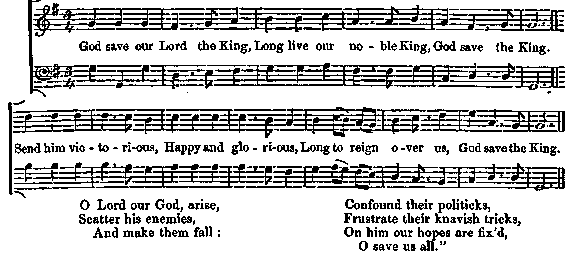Popular Music Of The Olden Time Vol 2
Ancient Songs, Ballads, & Dance Tunes, Sheet Music & Lyrics - online book
| Share page | Visit Us On FB |
|
|
||
|
704 ENGLISH SONG AND BALLAD MUSIC. |
||
|
|
||
 |
||
|
|
||
|
The above is taken from p. 22, of " Harmonia Anglicana; A Collection of two, three, and four-part songs; several of them never before printed. To ■which are added some Choice Dialogues, set to music by the most eminent masters, viz., Dr. Blow, H. Purcell, Handel, Dr. Green, Dl. Purcell, Eccles, Weldon, Leveridge, Lampe, Carey, &c. The whole revis'd, carefully corrected, and figur'd by a judicious master. London, Printed for, and sold by John Simpson, at the Bass Viol and Flute in Sweeting's Alley, opposite the East Door of the Koyal Exchange."
The copy of " God save the King" in The Gentleman's Magazine for October, 1745, has hitherto been referred to, as the earliest printed authority. That version consists of the three stanzas which are still usually sung, and commences " God save great George our King." There are two wrong notes in the fourth bar of the melody in that copy, viz., B and C, which should be A and B. The base proves these to be typographical errors, and not intentional alterations of the tune. In the table of contents of The Gentleman's Magazine the older title of " God save our Lord the King " is retained, agreeing with the copy now produced; and when theHarmonia Anglicana was extended to two volumes, and the name changed to Thesaurus Musicus, although the song was then printed as " God save great George our King," the index remained unaltered—" God save our Lord the King." In JSarmonia Anglicana the only heading is, " For two voices." In Thesaurus Musicus, it is " A Loyal Song, sung at the Theatres Royal, for two voices." There is not a word about " anthem " in either copy, nor does the original publication contain any other than secular music. In the Gentleman's Magazine, it is " A Song for two voices, sung at both play-houses."
The Harmonia Anglicana is printed without date, but a clue to the time of publication is obtained in the following way. There are several works advertised by the publisher on the title page, and three or four more seem to have been added subsequently to fill up vacant space on the index plate. The last of these are " Two collections of favourite Scotch tunes, set for a violin, German flute, or harpsichord, by Mr. Oswald." These two collections were advertised in November, 1742.
I cannot understand how the above copy of "God save the King" can have escaped Dr. Burney's notice, if he took any trouble in the matter. Perhaps he |
||
|
|
||